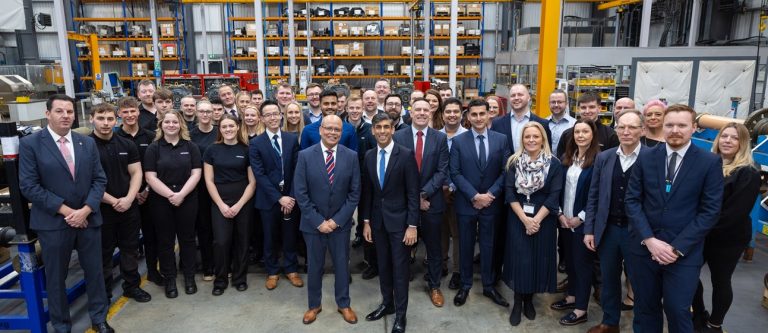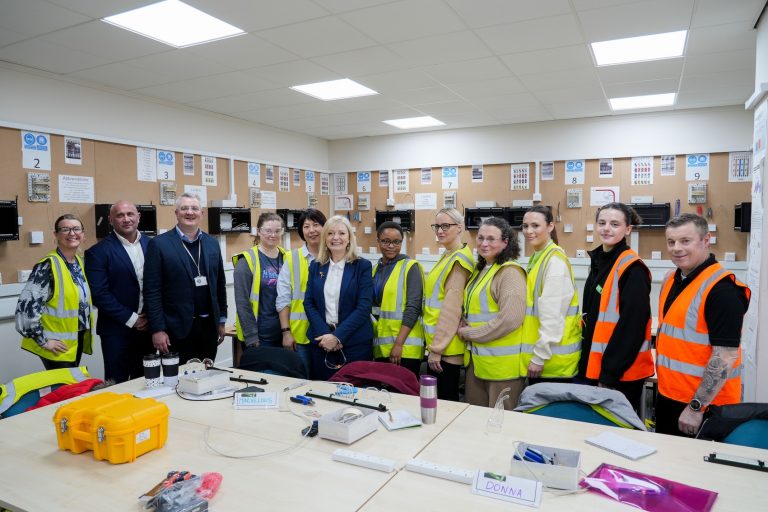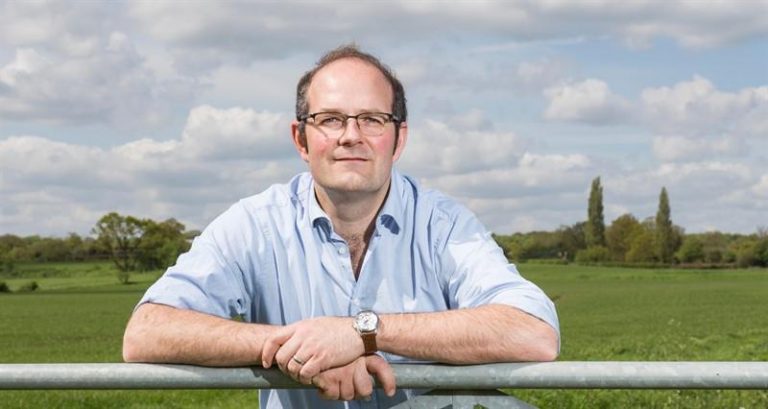APSS Group invests in state-of-the-art showroom
Commercial interior design and fit out business APSS Group recently celebrated the completion of its newly-refurbished showroom with a VIP launch event at its headquarters in Lincoln.
Over 100 businesspeople from across the East Midlands, as well as local dignitaries including the Mayor of Lincoln Biff Bean attended the Gin and Jazz themed event with gin tasting provided by the team from Bainland Lodge Retreats and live music by saxophonist Ben Lester.
APSS’ commercial team provided tours of the new showroom, which features the latest in workplace technology, including acoustic ceiling rafts designed to reduce reverberation and echo, touch screen TVs, Zoom meeting rooms with angled tables so everyone can be seen on camera, and a virtual reality room for virtual tours of newly designed spaces.
With TPS Office Furniture having recently joined the APSS Group, the showroom also includes feature displays of chairs and the latest trends in commercial furniture as well as a soft furnishing sample wall so clients can see and feel the wide range of materials available.
A beech-hut-themed meeting pod and relaxed space are featured within the office space with a halo light – providing the option for an open or closed meeting space.
Laurence Barrass, Managing Director at APSS Group said: “The new showroom represents a significant investment and provides the perfect space to demonstrate what’s new in contemporary office design and space planning. This includes how technology can easily be incorporated into the workspace as an integral part of the design.
“The team was very excited and proud to showcase our expanded range of products and services. Over the past 25 years, we have evolved from providing office partitions and storage systems to offering a complete design and fit-out service.
“We really enjoyed showing our valued customers and suppliers around our Lincoln headquarters.”
Benedict Heaver, Managing Director at Streets Heaver, was in attendance and he said: “The showroom looks great and the benefit of seeing it first-hand is that it provides inspiration on what’s possible for contemporary workspaces.
“The VR room provides an enhanced experience as it allows you to really visualise how a space will look and feel. The halo lights, fabric swatches and furniture displays are a great addition to the showroom and impressive for those visiting for the first time.”
For over 25 years, commercial office fit out specialist APSS has been at the forefront of designing and creating dynamic spaces for organisations in a wide range of sectors including professional services, industrial, retail, education and healthcare. Following its recent acquisition of TPS Office Furniture, it has expanded its services to include high quality, contemporary furniture.
Laurence added: “As the group embarks on this exciting new chapter, it remains committed to keeping innovation, quality, and customer satisfaction at the forefront of the business. Our new showroom is testament to our commitment to transforming environments and enriching lives through exceptional design.
“Creating a more visually appealing working environment has been proven to increase productivity and is an attractive benefit for existing staff and well as prospective employees.”
Prime Minister brings Cabinet to meeting at Goole rail facility
Rishi Sunak and his Cabinet have visited the Goole Rail Village, meeting Siemens Mobility’s UK & Ireland Joint CEO Sambit Banerjee and speaking to a group of apprentice engineers and technicians.
Siemens is in the final stages of fitting out the Train Manufacturing Facility, which is set to open this spring.
Sambit Banerjee, said: “It was a great honour to welcome the Prime Minister and the Cabinet to our Goole Rail Village and for him to talk to our talented train engineers of the future.
“We are proud that we will be assembling the next generation of Britain’s trains right here in Yorkshire, as part of how we transform rail travel in the UK.
“Our investment in Goole is levelling up in action, and the lasting legacy of skills we are creating at this centre of excellence will help transform rail for the North.
The Components Facility, where the Government held the Cabinet meeting, is a part of the wider Goole Rail Village which made up from the Train Manufacturing Facility, Logistics Centre and the Rail Accelerator and Innovation Solutions hub for Enterprise (RaisE), establishing Goole as a centre of excellence for rail technology in the UK.
The Components Facility, which is open already, overhauls and repairs capabilities on gearboxes, traction motors, fan systems and HVAC units for Siemens’ train and tram fleets across the UK, which make up almost one quarter of passenger trains.
All of Siemens’ future UK train orders will be built at Goole, starting with the Piccadilly line trains for Transport for London. The Train Manufacturing Facility will also be capable of serving other global markets by 2030.
Hull’s hospital porters are the best in the country – and that’s official
Porters at Hull Royal Infirmary and Castle Hill Hospital have been selected from 300 entrants to be Portering Team of the year at the National MyPorter Awards held in London.
Graham Taylor, Interim Portering, Postal and Switchboard Manager, says: “Being recognised nationally as ‘Portering Team of the Year’ is outstanding and I am immensely proud to represent this team. Their responsibilities and duties go far beyond simply pushing a stretcher or moving a bed. “They are expert communicators, constantly keeping patients and their families informed and reassured during difficult and often uncertain times. Their dedication and compassionate attitude towards their work make them invaluable members of our organisation. “This team truly is phenomenal, and it fills me with pride to witness their unwavering commitment to making a positive impact on the lives of patients and their families every day. “The team may not always receive the recognition that they truly deserve, but their contributions are immeasurable. They are the unsung heroes who quietly and efficiently keep the hospital running and deserve to be celebrated for their hard work and dedication.”T he hospitals are part of a Group including Goole, Grimsby and Scunthorpe, employing 17,000 staff and caring for over a million patients every year. Getting people and resources to their destination in an organisation of that size is no mean task, but this 120-strong team handles this responsibility effortlessly.Hull’s Colonial Street subject to archaeological dig as development progresses
Hull City Council is carrying out preliminary archaeological excavations on Colonial Street as an important precursor for the site’s planned redevelopment.
The land to the rear of St Stephen’s Shopping Centre is currently under examination to establish the history of the site and whether it retains any archaeological interest.
The Colonial Street site is allocated for housing development in the Local Plan and is owned by the council.
In July 2023, Cabinet approved plans to seek to bring forward around 200 properties on the site.
The exploratory work is being undertaken by the council’s Humber Field Archaeology team and will help to inform the development approach and improve availability of site information, ahead of redevelopment.
If the site is found to be of archaeological interest, further investigations may be undertaken, with a community activity a possibility later in the year.
Cllr Paul Drake-Davis, the council’s portfolio holder for regeneration and housing, said: “It is exciting that the council has made a start on the Colonial Street site, on the back of doing likewise at the former Clarence Mill site for the East Bank Urban Village.
“These developments are key to recognising the council’s need for city centre living, whilst regenerating previously unused land.”
West Yorkshire Mayor enrols almost 160,000 learners since devolution of adult education
More than 159,000 people have signed up for training in the two years since West Yorkshire Mayor, Tracy Brabin, took responsibility for adult education in the region, according to new figures.
Since being elected, the Mayor has invested £198 million of devolved funds to launch a wide range of courses aiming to boost skills and opportunities for people to get into good, well-paid jobs.
It’s also supporting West Yorkshire’s labour market and wider economy, creating a greater pool of skilled workers for businesses to recruit from.
Mayor of West Yorkshire, Tracy Brabin said: “I want everyone in West Yorkshire to have the chance to unleash their potential – and it’s working.
“Devolution has given us the freedom to invest in what’s best for our region and support people into real jobs, which simply wouldn’t be possible from Whitehall.
“We know learning and qualifications help people to access better paid jobs, and this is supporting families during a cost of living crisis as we work to build a stronger, brighter West Yorkshire.”
The news comes as the Mayor and Cllr James Lewis visited an all-female cohort of telecoms engineers who began training as part of a drive to boost the widespread skills shortage in the sector.
The Mayor has invested £2.5 million into the telecoms engineer training programme since it was launched in 2021. Over 1,200 people have become qualified as a result, and thanks to collaboration with local businesses, 80% have progressed directly into employment.
Cllr James Lewis, Leader of Leeds City Council and Chair of the West Yorkshire Combined Authority Business, Economy and Innovation Committee, said: “Access to training that rewards people with good, well-paid jobs should be available to all.
“Working with local businesses, we’re tailoring courses to fill vital roles in the local labour market, and highlighting the importance of a happy, skilled and diverse workforce.
“Devolution has already allowed us to upskill and re-train thousands of adults, and greater devolved powers would give us the opportunity to achieve so much more.”
Sheffield research to help make growing food greener
A new way to create synthetic fertilisers from waste by-products, which could provide a cost-effective, low-carbon alternative to current synthetic fertilisers for the UK’s farming industry, is being developed by the University of Sheffield.
Researchers from the University of Sheffield’s Energy Institute and the Institute for Sustainable Food are working with Future Greens, a Sheffield-based SME specialising in controlled-environment agriculture, on a research project designed to improve the sustainability of growing food.
Unlike traditional farming systems that grow crops in soil, this type of agriculture uses vertical water-based hydroponics systems that are totally reliant on the application of synthetic fertilisers to supply nutrients essential for plant growth.
Using hydroponics to quickly grow food like leafy greens has been a fast-growing industry in the UK commercially, as well as for individual homeowners with limited space and resources to grow their own food. However, high energy prices and volatile fertiliser markets have put this emerging industry at risk.
Notably, the cost of synthetic fertilisers, responsible for a significant portion of global energy consumption, has risen by 139 per cent within the last year in Britain. The sourcing of these fertilisers has fast become an economic and environmental concern, with production also responsible for 1-2 per cent of global energy use.
This new University of Sheffield project aims to combine food and energy research to advance sustainable farming practices, enabling farmers to grow plants like lettuce and spinach in a more sustainable way by developing an alternative sustainable process for the production of synthetic fertilisers.
This process will convert the by-products from anaerobic digestion – a technology which turns waste farm products like manure into energy – into a high-quality, water-soluble fertiliser suitable for food crops. This system, which combines biogas energy production with the conversion of waste products, fosters a more sustainable, circular and resilient system for farming.
Successful development of this innovative idea would provide a cost-effective, low-carbon alternative to current synthetic fertilisers for the UK’s farming industry, and would result in additional revenue for anaerobic digestion plants. It would also contribute towards the UK’s goal of a circular phosphorus economy, and build resilience in the UK food industry.
Dr Davide Poggio, Research Associate at the Energy Institute at the University of Sheffield, said of the project: “This project represents a novel, systemic approach to urban biowaste management. By integrating biogas technology with vertical farming, we aim to efficiently recycle nutrients and recover energy within urban settings, and enhance the security and sustainability of key hydroponic crops.”
Alexander La Fleur, from Future Greens, said: “Working with the university is really exciting for us, since graduating two years ago it’s nice to be back and tap into the valuable expertise. The grant presents a really promising opportunity to find a solution to the environmental and economic challenges facing the fertiliser industry.”
The project, which is supported by an Innovate UK Research Starter grant, will foster further collaboration between Future Greens, with Dr Davide Poggio from the University of Sheffield’s Energy Institute and Dr Ian Lidbury from the University of Sheffield’s Institute for Sustainable Food, with Jacob Nickles from the University of Manchester serving as the Innovation Manager.
The project will result in a demonstrator at the Future Green site to evaluate the practical application of the new technology.
West Yorkshire recycling company fined £120,000 after worker injured by 300kg batteries
A recycling company in West Yorkshire has been fined £120,000 after batteries weighing at least 300kg fell onto an employee and severely injured him.
The man was working with two colleagues at Wastecare Limited’s site on North Dean Business Park, Halifax when he was struck by the batteries being recycled on 22 March 2019.
The three workers had been restacking the batteries that were stored in Flexible Intermediate Bulk Containers (FIBCs) after it had toppled over.
However, the FIBCs started to rip in front of them leading to the batteries falling on to one of the workers.
He suffered a double compound fracture to his lower right leg, a fracture to the left tibia, a fractured right collar bone, some bruising to his ribs and a cut on his forehead.
A Health and Safety Executive (HSE) investigation found Wastecare Limited failed to ensure the health, safety, and welfare of its employees at work. The site was overstocked, bags of batteries had been stacked in an unsafe manner and there was no specific documented risk assessments or safe systems of work for the correct stacking and storage of batteries. This was not an isolated incident.
HSE guidance says FIBCs must not be stacked unless the FIBC is designed to be stacked and only then should it be stacked in either a pyramid form or against two walls.
Wastecare Limited, of Normanton Industrial Estate, Normanton, West Yorkshire, pleaded guilty to breaching Section 2 (1) of the Health & Safety at Work etc Act 1974. The company was fined £120,000 and ordered to pay £4,937.39 in costs at Leeds Magistrates’ Court on 21 February 2024.
HSE inspector Jackie Ferguson said: “There are specific Industry Standards and Guidance relating to Flexible Intermediate Bulk Containers (FIBCs) which provides users with information on a range of aspects relating to their use including filling, discharging, handling and storage.
“This incident could so easily have been avoided by implementing simple control measures and safe working practices to ensure the batteries were stacked safely and securely. The industry should be aware that HSE will not hesitate to take appropriate enforcement action against those that fall below the required standards.”
This HSE prosecution was brought by HSE enforcement lawyer Samantha Crockett and supported by HSE paralegal officer Stephen Parkinson.
Lilly strengthens Hull-based family law team
Lilly Walker has joined law firm Rollits as an additional Senior Solicitor in its family law team.
She joins Alison Benson, Partner and Head of Family, and Senior Solicitor Sarah Wasling in the family law team.
Alison said: “Our expert teams have supported clients needing help through all types of family law matters for more than 180 years and Lilly’s appointment helps us ensure that we continue to tailor our services specifically to the needs of all clients.
“That applies to private and personal matters and to the corporate environment. In family and owner managed businesses, operations can be intertwined with relationships and undoubtedly family problems can affect the business if they are not properly managed.”
The family law team, which has almost 40 years of shared experience of divorce and separation matters, is based at Rollits’ head office in High Street, Hull.
Red Sea disruption causes severe headaches for UK businesses
Increases in costs and delivery times caused by shipping disruption in the Red Sea are causing headaches for UK businesses according to new research by the British Chambers of Commerce.
Issues cited by firms included increased costs, with some reporting rises of 300% for container hire, and logistical delays, adding up to three to four weeks to delivery times. Firms also said this was creating knock-on effects such as cashflow difficulties and component shortages on production lines.
William Bain, Head of Trade Policy at the BCC, said: “This research gives us immediate insight into the impact of Red Sea disruption on UK businesses.
“There has been spare capacity in the shipping freight industry to respond to the difficulties, which has bought us some time. And recent ONS data also indicates the impact has yet to filter through to the UK economy, with inflation holding steady in January.
“But our research suggests that the longer the current situation persists, the more likely it is that the cost pressures will start to build.
“Certain sectors of the economy are obviously more exposed to this than others. But with the recent introduction of the Government’s new customs checks and procedures for imports also adding to costs and delays, it is a difficult time for firms.
“The UK economy saw a drop in its total good exports for 2023, and with global demand weak, there is a need for the Government to look at providing support in the March Budget.
“We are calling for the establishment of an Exports Council to hone the UK’s trade strategy and a review of the effectiveness of government funding for export support.
“Overseas trade is vital to growing our economy. We must do everything we can to see businesses through these tough times, and then set a laser-sharp focus on expanding exports for the future.”
Sainsbury’s signs up as third retailer to back nation’s farmers with ‘buy British’ web tab
The move follows an open letter written by Conservative MP Dr Luke Evans to the chief executives of eight major supermarkets asking for a filter which would direct shoppers to homegrown food to help boost the economy and cut the UK’s carbon footprint.
The letter was was co-signed by 125 cross-party MPs, and echoed a long-standing NFU ask dating back to 2016.
Simon Roberts, CEO at Sainsbury’s, said: “Many of our customers want to support British suppliers and make more conscious choices when doing their food shop, and our new Buy British webpage helps them to do just that through a curation of over 450 quality, 100% locally sourced products.
“We recognise the pressures that British farmers are facing and the importance of supporting them to maintain a resilient UK food system for the long term. Our relationships with farmers and suppliers are incredibly important to us and we remain committed to sourcing British as much as we can, now and in the future.”
NFU President Tom Bradshaw said it was fantastic to see supermarkets getting behind Dr Evans’ campaign. He said: “I’m delighted that Sainsbury’s is also backing British farmers by adding a British section online in order to signpost shoppers to home-grown produce.Our own independent research shows the public want to buy more British food from retailers and we have been championing this issue for some time.”












